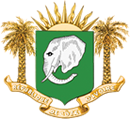TRAINING SEMINAR ON UNESCO CITY NETWORKS AND PROGRAMMES « PRESENTATION OF APPLICATION MECHANISMS FOR UNESCO CITY NETWORKS AND PROGRAMS »
query_builder 18-01-2024
Monsieur le Chef de Cabinet du Ministre de l'Éducation Nationale et de l'Alphabétisation ;
Mr. Representative of the UNESCO office in Abidjan ;
Mr. Representative of the Moroccan National Commission for UNESCO;
Mr. Secretary General of the Ivorian National Commission for UNESCO;
The Director General of the Université Virtuelle de Côte d'Ivoire (UVCI);
Mr. President of the University of Man ;
Mr. President of the University of Bondoukou;
Honorary Dean of the Languages, Literature and Civilizations Department of the Université Félix Houphouët-Boigny;
Ladies and Gentlemen, Vice-Presidents of public and private universities and business schools;
Representatives of local and regional authorities;
Mr. Representative of the Union des Villes et Communes de Cote d'Ivoire ;
Holders of UNESCO Chairs;
Dear students ;
Fellow professors and researchers;
Dear students ;
Ladies and Gentlemen ;
Distinguished participants ;
It gives me great pleasure to speak on behalf of the Côte d'Ivoire Delegation to UNESCO at the opening ceremony of the training seminar on UNESCO city networks and programs.
First of all, I would like to express my gratitude to the Minister of National Education and Literacy, Professor KONE Mariatou, President of the Côte d'Ivoire National Commission for UNESCO, and to the Minister of Culture and Francophonie, Madame Françoise REMARCK, for their commitment in supporting Côte d'Ivoire's candidate cities to join UNESCO's Networks of Cities and Programmes.
I would also like to express my sincere thanks to the Director General of the Université Virtuelle de Côte d'Ivoire, Professor KONE Tiemoman, who unreservedly agreed to host this seminar and made all the necessary arrangements to welcome us both in person and virtually.
My thanks also go to the Head of the UNESCO Office in Côte d'Ivoire, Mr DIOP Omar, and to the Secretary General of the Côte d'Ivoire National Commission for UNESCO, Professor SORO N'Golo, and their teams, who are contributing their expertise to this important training seminar.
Ladies and Gentlemen
Distinguished participants
This training seminar, co-organized by the Ivorian National Commission for UNESCO and the Permanent Delegation of Côte d'Ivoire to UNESCO, in partnership with the Union des Villes et Communes de Côte d'Ivoire (UVICOCI), is of the utmost importance for our country, and particularly for our towns and cities.
Indeed, it is a major first that representatives of regional councils, communes, public and private universities, the UNESCO Chair in Bioethics, UVICOCI, civil society, ministries in charge of education and culture, and UNESCO experts are joining forces to support Ivorian communes applying to join UNESCO's city networks and programs. The importance of participating in these UNESCO networks is an opportunity to rethink Ivorian cities, which are increasingly populated, multicultural and faced with numerous challenges such as poverty, social inequalities, conflicts, environmental disasters and food insecurity.
It is important to note that UNESCO city networks, through the activities and synergies they generate, constitute an international platform that encourages cooperation between cities to mobilize their potential to transform the challenges they face into opportunities.
Furthermore, cities, through the sharing of experience, knowledge and best practices, are key contributors to the implementation of the United Nations Sustainable Development agenda, in particular of the MDG4 "Ensure access to quality education for all and promote lifelong learning" and the MDG11 "Make cities and human settlements inclusive, safe, resilient and sustainable".
Hence the interest of this training seminar, which aims to:
- acquaint participants, particularly municipal representatives, with UNESCO's eight city networks and programs;
- explain the rules governing membership of the networks, as well as their advantages;
- explain how to submit an application;
- direct communes towards the various networks according to their potential;
- present the role of the various players, in particular the representative of the town hall and the Ivorian National Commission for UNESCO.
Ladies and Gentlemen
Distinguished guests,
This seminar is all the more important given Côte d'Ivoire's low level of participation in networks, as we shall illustrate through two networks: that of creative cities and that of learning cities.
The Creative City Network was launched in 2004 to strengthen the cultural identity of cities, and to promote cooperation with and between cities that have identified creativity as a strategic factor in sustainable economic, social, cultural and environmental development.
Of the 350 Creative Cities from over 100 UNESCO member states, only around twenty are located on the African continent. There are no Ivorian cities in the network. I'm sure you'll agree that Grand-Bassam and many other Côte d'Ivoire cities have enormous potential for joining the Creative Cities network.
As for the World Network of Learning Cities, it was launched in 2013 by the UNESCO Institute for Lifelong Learning (UIL). To foster social cohesion, economic development and sustainable development in urban areas.
A learning city is a city that effectively mobilizes its resources to ensure quality, inclusive lifelong learning for its citizens, and promotes individual empowerment, social inclusion, equity and well-being for all.
Out of 294 Learning Cities in 76 UNESCO member states, Africa has just 12 cities in 9 countries.
In Côte d'Ivoire, only the city of Bouaké has been part of the World Network of Learning Cities since September 2, 2022. I would like to take this opportunity to congratulate the outgoing Mayor, Senator Nicolas Youssouf DJIBO, and Minister Amadou KONE, Minister of Transport and Mayor of the Commune of Bouaké, who worked hard to have their Commune admitted to the Network.
I would also like to welcome the presence of representatives of the presidents of public and private universities, who have decided to invest in the implementation of this program, which places quality education and lifelong learning at the heart of university policy.
I would also like to take this opportunity to express my gratitude to the Presidents of the Regional Councils and the Mayors for their strong involvement in this seminar. Special thanks go to Mr Eugène AKA AOUELE, President of CESEC, President of the Conseil Régional du Sud Comoé, Mr Fidèle SARASSORO, Minister, Cabinet Director of the President of the Republic, President of the Conseil Régional du Poro, Mr Adama COULIBALY, Minister of the Economy and Finance, Mayor of the Commune of Dimbokro, and Mr. TOURE Mamadou, Minister for the Promotion of Youth, Professional Integration and Civic Service, President of the Regional Council of Haut Sassandra, for their great interest and constant support for this program.
Thus, through this seminar and, we hope, future seminars, Côte d'Ivoire will be able to contribute to strengthening the position of the African continent in UNESCO's city networks and programs.
This is why, dear participants, I invite you to follow this session assiduously, so as to familiarize yourselves with the practicalities of putting together candidacy files, and to encourage local elected officials to do their utmost to ensure that their communes join the UNESCO city networks.
I urge each mayor whose commune is a candidate to make a firm commitment to the process of integrating his or her commune into the networks, and to ensure that all stakeholders play an active part.
I would also like to know that I can count on the Ivorian National Commission to support the communes in preparing their application files, and to monitor the program coordination teams.
Only in this way will Côte d'Ivoire be able to present high-quality applications that will be eligible for the various networks identified. The aim remains to make our cities safe, sustainable and creative places, where living together and inter-cultural dialogue are a reality. By extension, this will foster the stability, social harmony and peace on which UNESCO's mission is founded.
I can't conclude without expressing my heartfelt thanks to the speakers, with a special mention for the experts from the Moroccan National Commission for UNESCO, who will be sharing their experience and best practices with us. The establishment of the Alliance of Learning Cities and the African National Commissions is a Moroccan initiative that we welcome and support.
I wish you every success in your work, and hope that all candidate cities will be eligible for the networks identified, so that the communes can effectively support the local development policy put in place by the President of the Republic, His Excellency Alassane OUATTARA.
Thank you very much.





